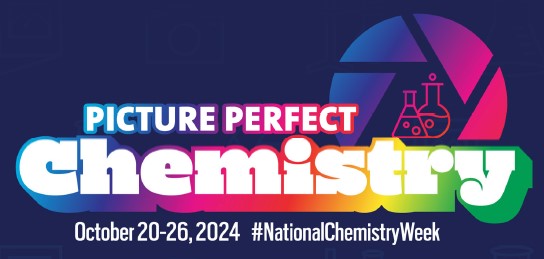Section News & Happenings
2025 WCC Merck Research Award – Apply by 11/15/24
WCC Merck Research Award recognizes eight individuals* who will present their research at a Women Chemists Committee (WCC)/Merck half-day symposium during the ACS Fall 2025 Meeting. Individuals should be in their third or fourth year of graduate school and focus in Organic, Medicinal, Chemical Biology, Computational, or Structural Chemistry. Related disciplines are eligible. The award is open to U.S. citizens and non-U.S. citizens attending a graduate program in the U.S. or Canada. The deadline to apply is November 15th, 2024. Click here to apply.
*This includes women (both cis and trans) and persons assigned female at birth (AFAB)
37th Annual Faraday Lecture
Be sure to check out the 37th annual Faraday Lecture on Wednesday November 13th at 10:00 am at Soldiers and Sailors Memorial Hall. This free lecture presented by Ray Euler from the University of Pittsburgh will explore various chemistry and physics demonstrations following the theme “Don’t Blink!”
This event is gears towards middle and high schools, seating availability is first come – first serve. Click here to register for the event! Any questions can be directed to Cally Shouse at [email protected].
Posters for this event can be found in this year’s November issue of The Crucible.
2024 Distinguished Service and Pittsburgh Award Winners
Congratulations to our 2024 Distinguished Service Award Recipient Dr. Kimberly Woznack and our 2024 ACS Pittsburgh Award Recipient Dr. Evan Granite! To read more about the award recipients be sure to check out the November 2024 issue of The Crucible.
November 2024 Issue of The Crucible
We are pleased to provide the November 2024 Issue of the Crucible! If you have something you would like included in future issues, please email Alysia Mandato at [email protected].
October 2024 Issue of The Crucible
We are pleased to provide the October 2024 Issue of The Crucible. If you have something you would like included in future issues, please email Alysia Mandato at [email protected].
Environmental Group Lecture XIII
Join the Environmental Group for the monthly lecture on Wednesday, October 16. Download the flyer here.
Sustainable Chemistry in the Context of Sustainable Food Systems
October 16, 2024, 12:00-1:00pm (EST)
Vania G. Zuin Zeidler, PhD, Institute of Sustainable Chemistry, Leuphana University, Germany
How to join:
Teams Meeting:
ID: 422 076 052 42
Passcode: xWHQgg
Or contact [email protected]
On the Road: Pittsburgh ACS Meeting at Saint Francis University
We are hosting an “On the Road” ACS meeting and seminar at Saint Francis University on Tuesday, October 22 at 5:30 PM. The ACS meeting will be held at 5:30 PM, followed by a lecture from Dr. Karah Knope from Georgetown University called “Hooked on f-elements”. RSVP here by Tuesday, October 15. Download the flyer.
National Chemistry Week 2024 Illustrated Poetry Contest
Picture Perfect Chemistry
The Pittsburgh Local Section of the American Chemical Society (ACS) is sponsoring an illustrated poem contest for students in kindergarten through 12th grade.
Contest Deadline: Sunday, October 27, 2024 by 11:59 PM ET
Prizes: $50 1st Place and $25 2nd Place in each of 4 grade categories: K-2nd, 3rd-5th, 6th-8th and 9th-12th grades.
Contact: Evonne Baldauff, NCW Coordinator. Mail entries to 51 W. College St., Waynesburg, PA or scan and email to [email protected].
Winners of the Pittsburgh Local Section’s Illustrated Poem Contest will advance to the National Illustrated Poem Contest for a chance to be featured on the ACS website and to win prizes!
Download the flyer for more details.
National Chemistry Week 2024

Pittsburgh Local Section NCW activities for 2024
Join us for a series of events throughout the entire week. Watch for emails and check our Facebook page and website for updates! For additional information regarding any of these events, contact NCW Coordinator, Evonne Baldauff, at [email protected].
Event 1: “Picture This” Lab experiments, Carnegie Science Center, October 21, 23, & 24
A series of hands-on experiments in a traditional lab setting for local high school students. Volunteers are needed to serve as lab assistants and will work directly with participants. Multiple daily lab sessions run from 10:15-11:15 AM and 11:30-12:30 PM. Up to 8 volunteers are needed each day. To sign up, contact Evonne Baldauff ([email protected]).
Event 2: SciTech Days: Art and Science Demos at the Carnegie Science Center, October 25
A traditional exposition-style event, schools from the Pittsburgh region and surrounding communities will bring students to experience hands-on demonstrations and activities on October 25th. Volunteers are needed to host demonstration tables and serve as career panelists. Volunteer through the following form: SciTech 2024‐2025 Registration
Student Grants: ACS Student Chapter Mini-ChemFest Events
Exclusive for undergraduate chapters, host your own ChemFest outreach event for local schools in your geographic area using the NCW 2024 theme. Funding of up to $200 is available. To sign up, contact Marsha Grimminger ([email protected]).
Summer Member Engagement Picnic
11:00 AM – 4:00 PM on Sunday, August 25, 2024
Algonquin Shelter, Settlers Cabin Park, 608 Ridge Rd, Pittsburgh, PA 15205
Join Pittsburgh ACS Members for food, fun, and activities! We will provide a variety of delicious foods, fruits, and drinks. You will also enjoy member engaging games, trivia quizzes, and chance to win a raffle. Feel free to bring your favorite lawn games such as frisbee, corn hole, or any other ball games to share the fun with everyone.
Registration fees are refundable upon attendance! The first six new members signed up on-site will receive free standard membership. Gas subsidies will be provided for those who travel more than 50 miles, at $0.25 per mile up to a total of 2000 miles.
Click here to download event flyer. Register for the picnic by August 16. Registration fees are refundable upon attendance!

